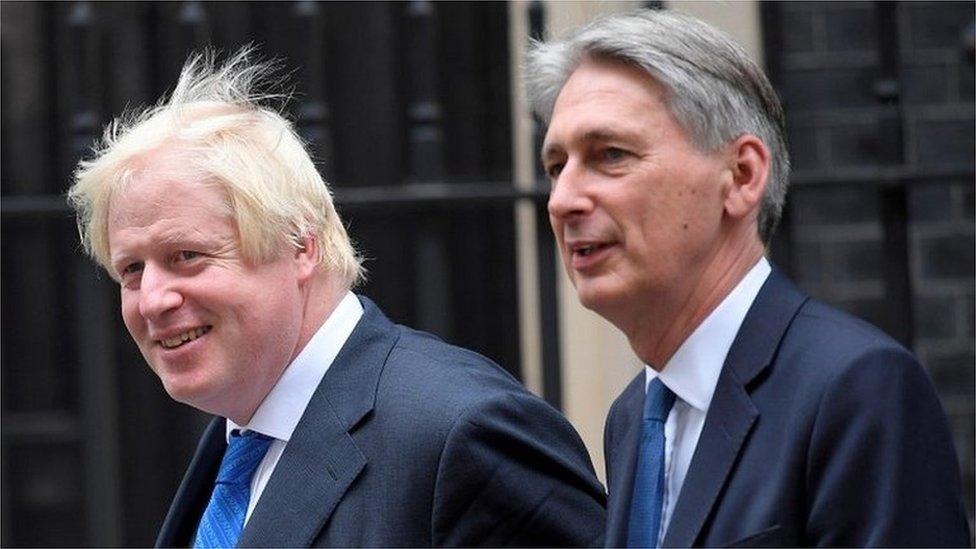Lord Hammond sets scene for Tory cash clashes
- Published

Philip Hammond has never been Boris Johnson's number one fan, to put it mildly.
They clashed on Brexit, with the former chancellor being booted out of Parliamentary Conservative Party during the wild political autumn of 2019.
But even though he is back in the party fold, and with the ermine of a Tory member of the House of Lords no less, the former occupant of Number 11 isn't mincing his words.
While he sticks to the broad consensus backing the government's massive emergency economic support during the pandemic, Lord Hammond looks very pointedly to the challenges that will come next, questioning whether Downing Street will have the right priorities.
'Scarring effect'
He told me: "My fear is that, as a populist government, giving money away is always easier than collecting it in.
"And the government will be tempted not to move quickly back to normalising the relationship between government and citizen, the balance between taxing and spending as we move out of the crisis and into the next phase, which is dealing over the longer term with the legacy of this Covid crisis - what the economists called the scarring effect on the British economy."
And he called on the prime minister to tell the public "some difficult home truths", urging the government to ditch what he described as "very extravagant" promises from its manifesto.
His not very subtle implication: Downing Street would rather be popular than do the right thing.
With just a few days to go before the Budget, a Treasury spokesperson said: "The chancellor has always put protecting jobs and livelihoods at the heart of everything he has done and that will not change.
"This Budget will give people the reassurance they need in the immediate term, and he will be honest with the British people about how we are going to recover beyond this crisis."

Will supermarkets face higher taxes?
Rishi Sunak is almost certain to extend the emergency measures brought in to prop up the economy through the pandemic.
And he is likely to introduce some taxes, to help bear the costs - a windfall tax on companies or sectors that have done well through the crisis, like the supermarkets, is possible, so too a gradual increase in corporation tax.
With the economy still so fragile, and all the stresses and strains of the last year, there is no clamour right now for the government to start pulling back spending.
Now, as before the pandemic, Mr Johnson and his allies say there must be no return to the kind of squeeze on public spending that happened over the last decade.
And even though borrowing has ballooned, with interest rates so low, there is no immediate political imperative.
'Addicted to spending'
Even Lord Hammond, always seen as an advocate of lean spending, acknowledges the debt run up to pay for the crisis will take decades to pay off.
But he is not the only Conservative who fears that that the Tories' appetite to keep on top of the cash day-to-day has faded too much.
One serving minister told me they worried the government had become "addicted to spending".
Balancing the books certainly won't be at the top of the chancellor's list for the Budget next week.
Unemployment is still rising, many businesses are under massive pressure, and many families are experiencing real hardship.
But Lord Hammond's comments may prove the early flickers of what's likely to be a long and important political debate.
At the start of the pandemic Mr Sunak said it was "no time for ideology".
But as the emergency hopefully fades, the time for those fundamental clashes over ideology - how much to tax and spend - will return.
